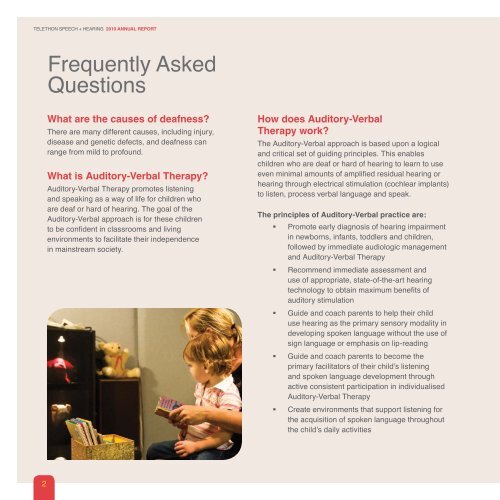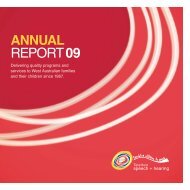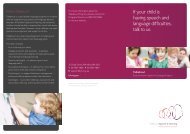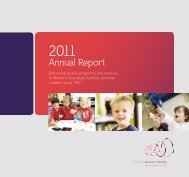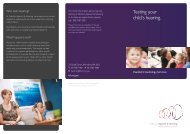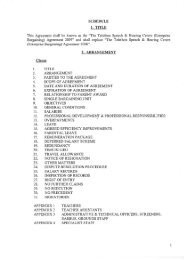REPORT 2010 - Telethon Speech and Hearing
REPORT 2010 - Telethon Speech and Hearing
REPORT 2010 - Telethon Speech and Hearing
You also want an ePaper? Increase the reach of your titles
YUMPU automatically turns print PDFs into web optimized ePapers that Google loves.
<strong>Telethon</strong> <strong>Speech</strong> + <strong>Hearing</strong> <strong>2010</strong> Annual Report<br />
Frequently Asked<br />
Questions<br />
What are the causes of deafness?<br />
There are many different causes, including injury,<br />
disease <strong>and</strong> genetic defects, <strong>and</strong> deafness can<br />
range from mild to profound.<br />
What is Auditory-Verbal Therapy?<br />
Auditory-Verbal Therapy promotes listening<br />
<strong>and</strong> speaking as a way of life for children who<br />
are deaf or hard of hearing. The goal of the<br />
Auditory-Verbal approach is for these children<br />
to be confident in classrooms <strong>and</strong> living<br />
environments to facilitate their independence<br />
in mainstream society.<br />
How does Auditory-Verbal<br />
Therapy work?<br />
The Auditory-Verbal approach is based upon a logical<br />
<strong>and</strong> critical set of guiding principles. This enables<br />
children who are deaf or hard of hearing to learn to use<br />
even minimal amounts of amplified residual hearing or<br />
hearing through electrical stimulation (cochlear implants)<br />
to listen, process verbal language <strong>and</strong> speak.<br />
The principles of Auditory-Verbal practice are:<br />
• Promote early diagnosis of hearing impairment<br />
in newborns, infants, toddlers <strong>and</strong> children,<br />
followed by immediate audiologic management<br />
<strong>and</strong> Auditory-Verbal Therapy<br />
• Recommend immediate assessment <strong>and</strong><br />
use of appropriate, state-of-the-art hearing<br />
technology to obtain maximum benefits of<br />
auditory stimulation<br />
• Guide <strong>and</strong> coach parents to help their child<br />
use hearing as the primary sensory modality in<br />
developing spoken language without the use of<br />
sign language or emphasis on lip-reading<br />
• Guide <strong>and</strong> coach parents to become the<br />
primary facilitators of their child’s listening<br />
<strong>and</strong> spoken language development through<br />
active consistent participation in individualised<br />
Auditory-Verbal Therapy<br />
• Create environments that support listening for<br />
the acquisition of spoken language throughout<br />
the child’s daily activities<br />
2


